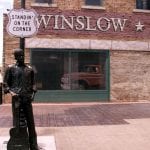It’s Time to Take It Easy on the Eagles
Shitting on the Eagles is basically a national pastime for hard-core Americana fans. In fact, while there are several brilliant artists that alt-country loyalists are apt to bond over, dislike of the Eagles may be the single most prevalent and unifying force.
Yet while there is ample cause to loathe the Eagles, the band’s raw output leaves no doubt that they’re among the most influential bands in Americana history, especially when taking into account some of the insurgent acts of today. Yes, Glenn Frey’s an insufferable prick. But it’s time to take it easy on the band as a whole.
In order to make a legitimate case for Eagles redemption without coming off like a troll, it’s important to acknowledge–and, when appropriate, refute–the many reasons why people hate the band. And the number one reason is Frey, the Rahm Emmanuel to Don Henley’s Obama, only a lot less lovable.
Frey, a native Michigander, got into music to become famous and reap the benefits that came with it. If playing chamber music were the most direct path to doing so at the time, he would have taken up lute. He moved to Los Angeles because it was the entertainment industry’s nerve center, and wrote songs not out of creative necessity, but to land on the charts. Within the group, Frey consistently antagonized his bandmates, with former Flying Burrito Brother Bernie Leadon famously dumping a beer on Frey’s head before quitting (for an oral history of this anecdote and more, haters and lovers alike will find The History of the Eagles, aired earlier this year on Showtime, to be indispensable).
But it was not until the Eagles broke up–temporarily, it would turn out–in 1980 that Frey’s countrified posture would be proven irrefutably fraudulent. As a solo artist, his Miami Vice-inspired renderings were downright embarrassing, with “Smuggler’s Blues,” “The Heat Is On,” “Sexy Girl” and “You Belong to the City” ranking among the very worst songs ever written and recorded by anyone, ever. Don Henley could have never cut a single track during the band’s 14-year hiatus, and it still would have been abundantly clear that he was the main talent in the band. That Henley’s solo oeuvre is universally respected only makes the gap between the band’s founding members all the more glaring.
Then there’s Leadon, a former Gram Parsons collaborator and expert banjo player who came into the band with easily the best country chops of the original members. After dumping beer on Frey and walking out, he was replaced by Joe Walsh, a talented but buffoonish guitarist who epitomized ’70s rock-star decadence. While it was an open secret that even soft-rockers in that decade did mountains of blow and shagged groupies galore, adding Walsh to your lineup was basically an advertisement for such behavior. The Eagles were hardly alone here, but anyone looking for an excuse to turn on the band were handed one on a powdery platter, with a straw to boot.
And, Jesus Christ, the disco tracks. “One of These Nights” and “I Can’t Tell You Why” are abominations, even by disco standards. The latter was written and sung by Timothy B. Schmit, who, like Randy Meisner before him, the Eagles simply poached from Poco (like the Eagles, only worse and less successful) when they needed a vocalist who could hit super-high notes. He came along when the band was on the equivalent of a coke comedown, and one suspects he was permitted to record the track because Henley and Frey no longer gave a shit. “I Can’t Tell You Why” went on to become a radio hit, but sullied the band’s artistic credibility.
But you know who else dabbled in disco? The Rolling Fucking Stones. Only the difference between the two bands is that while the Eagles’ disco output is limited, the Stones really went there, and the results were mostly atrocious. And instead of just taking Gram Parsons’ sound and polishing the hell out of it, the Stones aped him before literally partying the alt-country icon into the ground. Yet the Stones get a pass, while the Eagles are crucified.
Therein lie two other factors that feed into Eagles-hate: appropriation and affectation. For many, they’ll never be authentically country or Southern enough. But Americana is nothing if not a mutt’s genre (or, put another way, a genre that prides itself on being anti-genre), while The Band, save for Levon Helm, hailed from Canada. And if you still want to go there, Don Henley grew up in small-town East Texas. Necks don’t run no redder than that.
Here in the Pacific Northwest, it’s impossible to listen to up-and-coming bands like The Maldives or Moondoggies and not discern the Eagles’ influence in their layered harmonies and dueling guitars. At the end of the day, all that matters is the music, and most of what the Eagles put out was pretty exceptional. I defy anyone to listen to “Seven Bridges Road,” “Desperado” or “Hotel California” and claim otherwise.
Clearly what fueled early Eagles hatred was the band’s enormous–and enormously unexpected–success and their shameless enjoyment of it, for nothing breeds thunderous criticism like jealous rage. And what’s perpetuated such hatred in later years is, simply, Glenn Frey’s continued existence. He’s a prickly jackass who was exposed as artistically vacant without his collaborators alongside him. But with those collaborators, he was a vital cog. Had he simply taken it easy in the ’80s instead of gravitating toward Harold Faltermeyer and South Florida chic, the Eagles, upon careful reexamination, might already be the Hall & Oates of Americana.




